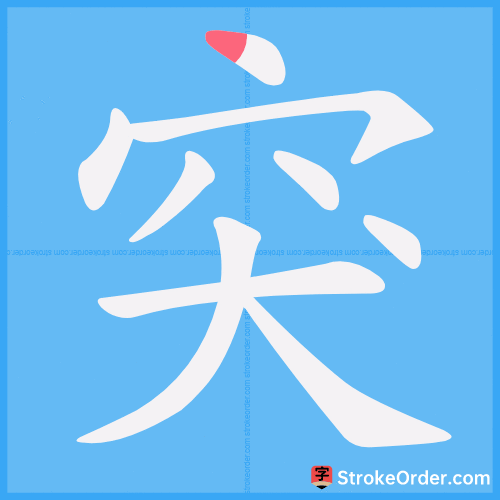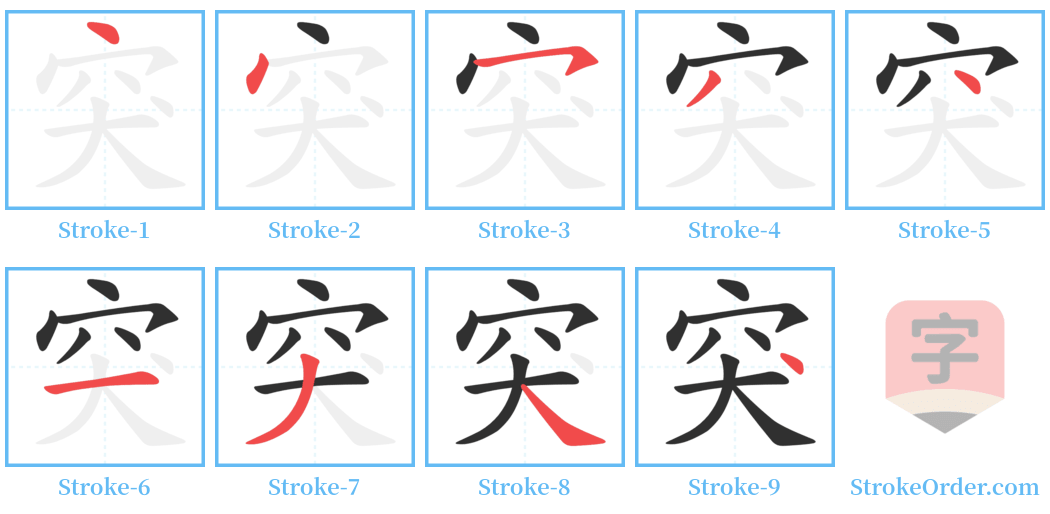突 Stroke Order
Animated Stroke Order of 突

Stroke Order Diagrams for 突

Step-by-Step Handwriting Guide for 突

Learn to Write Chinese Characters with Video Tutorials
Watch the video of writing the Chinese character "突", learn the correct stroke order (笔顺) of the character "突", and master the standard way of writing the character "突".
Free Printable Handwriting Practice with Stroke Order: 突
Printable Writing Practice Worksheet of "突" in Portrait Orientation (Tian Zi Ge)

Printable Writing Practice Worksheet of "突" in Landscape Orientation (Tian Zi Ge)

Information of 突
Pinyin
tū
Radical
穴
Strokes
9 strokes
Usage
★★★★★
Definition
to dash / to move forward quickly
突 (tū)
1. Suddenly.
忽然:~然。~现。~发。~变。~如其来。异军~起。~兀。
2. To exceed, to break through, to charge forward.
超出,冲破,猛冲:~破。~围。~出。
3. Chimney.
烟囱:曲~徙薪。灶~。
突 (tū)
Verb:
【Original Meaning】: A dog suddenly rushes out of a cave.
【Character Formation】: Association, composed of "穴" (cave) and "犬" (dog).
1. Dog run out suddenly.
狗从穴中突然而出 ([En.] dog run out suddenly)
2. Assault forward or outward.
急速地向前或向外冲 ([En.] assault forward or outward)
3. Offend.
触犯 ([En.] offend)
4. Cheat.
欺诈 ([En.] cheat)
5. Break.
穿;破 ([En.] break)
突 (tū)
Adjective:
1. Protrude; towering.
凸出;高耸 ([En.] protrude)
突 (tū)
Noun:
1. Chimney.
烟囱 ([En.] chimney)
2. Cave.
洞穴 ([En.] cave)
突 (tū)
Adverb:
1. Suddenly; abruptly.
忽然;猝然 ([En.] suddenly)
突 (tū)
Verb:
【Original Meaning】: A dog suddenly rushes out of a cave.
【Character Formation】: Association, composed of "穴" (cave) and "犬" (dog).
1. Dog run out suddenly.
狗从穴中突然而出 ([En.] dog run out suddenly)
【Reference】:
1. "Xuanzang": A dog suddenly emerges from the cave.
2. "Book of Han": In ancient times, horses were managed to charge forward.
2. Assault forward or outward.
急速地向前或向外冲 ([En.] assault forward or outward)
【Reference】:
1. Bai Juyi: The iron cavalry charged out with the sound of blades.
3. Offend.
触犯 ([En.] offend)
【Reference】:
1. "Xunzi": Offended by an offense.
4. Cheat.
欺诈 ([En.] cheat)
【Reference】:
1. "Guangya": "突" means to cheat.
5. Break.
穿;破 ([En.] break)
【Reference】:
1. "Zuo Zhuan": Breaching the city walls at night.
突 (tū)
Adjective:
1. Protrude; towering.
凸出;高耸 ([En.] protrude)
【Reference】:
1. "Lüshi Chunqiu": Can you make a stool protrude?
突 (tū)
Noun:
1. Chimney.
烟囱 ([En.] chimney)
【Reference】:
1. "Book of Han": Ink doesn’t flow on the protruding chimney.
2. Cave.
洞穴 ([En.] cave)
突 (tū)
Adverb:
1. Suddenly; abruptly.
忽然;猝然 ([En.] suddenly)
【Reference】:
1. "Book of Han": At the age of seventy, he heard of difficulties and rushed into the main gate.
sudden and violent attack / assault / fig. rushed job / concentrated effort to finish a job quickly
to break through / to make a breakthrough / to surmount or break the back of (a task etc) / (of ball sports) to break through a defense
Input Method for 突
Pinyin
tu1
Wubi
pwdu
Cangjie
jcik
Zhengma
wogs
Four Corner
30804
Unicode
U+7a81
Same Pronunciation Characters